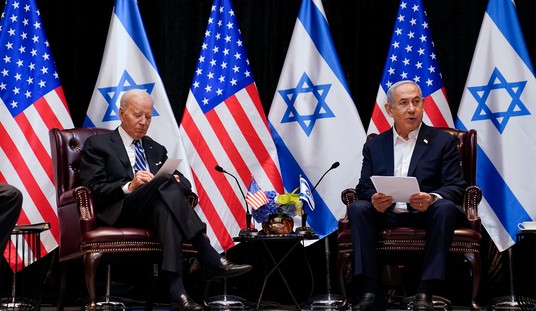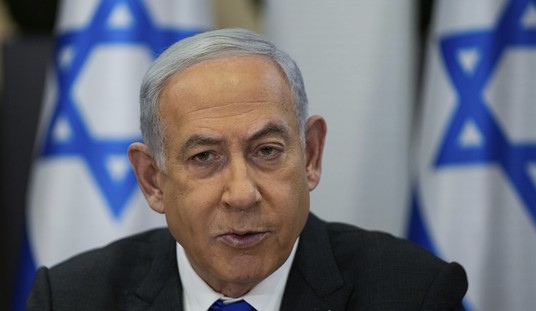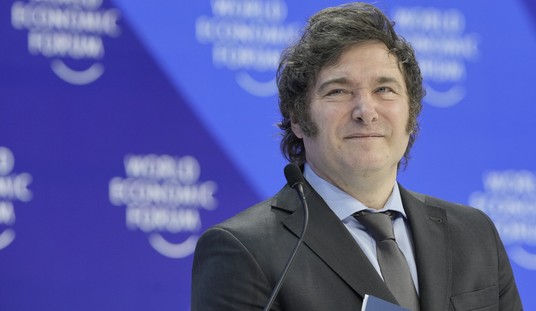This is the second of a two-part series about the rising tension and danger on the Lebanese-Israeli border. Don’t miss Part One: Everything Could Explode at Any Moment.
NORTHERN ISRAEL — Lisa and I followed Israeli Defense Forces Spokesman Zvika Golan as he led us in his jeep to the kibbutz of Malkiya right on the Lebanese-Israeli border, within immediate striking distance of Hezbollah’s rockets and bombs.
Zvika pulled off to the side of the road and pointed out a UN base just over the fence on the Lebanese side. He yelled something at the UN soldiers in Hindi. They waved and hollered back at him in Hindi. By happy coincidence, both Zvika and the peacekeepers are from India. Theirs is, perhaps, the only verbal communication that ever crosses that fence.

Photo copyright Michael J. Totten
At Malkiya we met Eitan Oren, an Israeli Kurd from Eastern Turkey. He gave Lisa and me a quick tour of the place which was unremarkable in almost every way. It looked, to my eyes anyway, like just another small town only with fewer roads and more foot paths connecting the buildings.
“It’s dying here,” Eitan said. “Socialism is out. Capitalism is in. The ideology collapsed. I was never a socialist. I don’t belong in the concrete jungle of Tel Aviv. I’m a nature boy. I belong here.”
Here, though, was right on the rim of a volcano. Hezbollah-occupied Lebanon was right there. And, as Zvika kept telling Lisa and me, the border was gearing up to explode.
The four of us got into Eitan’s pickup so he could take us on a brief driving tour.
“Since our withdrawal, the enemy – Hizb Allah – is on the fence,” he said. “See that post on the mountain?”

Photo copyright Michael J. Totten
“They are watching us right now,” Eitan said. “You are safe, though.”
“Don’t believe what he says,” Zvika said and laughed darkly. “You are not particularly safe right now.”
Zvika stripped off his officer’s clothes so he would look more like a civilian. He did that, I think, to protect Eitan, Lisa, and me, not himself.
Eitan pulled off the main road and into his peach orchard next to the fence.

Photo copyright Michael J. Totten
“Lots of drug fields right across the border right here,” he said. Hezbollah uses the drug money to purchase weapons to use against Israel. “Across the border are mostly Shia. We used to have a great relationship with them.”
It’s sort of true, up to a point. Yasser Arafat and the PLO had their own state-within-a-state in Lebanon during the 1970s. They used it as a base to carry out terrorist operations against Israel. In 1982, during the Lebanese civil war, Israel invaded – in effect becoming yet another militia in the ridiculous conflict – to put a stop to it once and for all. The PLO was driven out of Lebanon and into Tunisia. But the Israelis had a little side project going on at the same time. They tried to prop up the hard-right presidency of Bashir Gemayel, which turned into an utterly misguided disaster for everyone…particularly for the freshly elected Gemayel, who was assassinated by – who else? – Syrian intelligence agents.
The Shia of South Lebanon hailed the Israelis, for a while, as a liberation army that freed them from the PLO. The honeymoon didn’t last long, though. Israel stayed far too long, frequently treated the Shia with contempt, and monkeyed around with Lebanon’s internal politics just as much as the Syrians did.
“Nasrallah is a bright guy,” Eitan said, referring to Hezbollah Secretary General Hassan Nasrallah. “I wish his energy were directed toward something good. But Hezbollah has been infected by Iran.”
“What do you think of ordinary people on the other side?” I said.
“Every day I wave at Lebanese people,” he said.
“Do they ever wave back?” I said.
“Not usually, no,” he said. “They are cold. A few are friendly, though.”
“Do you know why most of them are cold?” I said. It’s unclear how much Israelis know about why things are the way they are inside Lebanon. He already knew I had been living in Beirut, and he could tell by the tone of my voice that I knew the answer.
“I don’t know,” he said. “Why?”
“Because waving hello to an Israeli is treason,” I said.
He looked startled and more than a little disturbed.
“I didn’t know that,” he said. “Some wave hello to me anyway. Do you know why?” I didn’t. “Because they are my friends. They know me. We used to work together when the border was open.”
Of course. The border was open until 2000 when Ehud Barak withdrew the Israeli forces from their anti-Hezbollah “security belt” in South Lebanon. Lebanese crossed the border every day through Fatima’s Gate to work in Israel. Some of them worked with Eitan. Even now they risk being punished for treason so they can wave hi.
“Come with me, my friends,” Eitan said. “ I want to show you something.”
Lisa, Zvika, and I got into his pickup and drove for another few minutes along the fence.
We got out at an elevated clearing. I grabbed my notebook and camera.

Photo copyright Michael J. Totten
Eitan pulled out a hand-drawn map that showed Northern Israel and the Upper Galilee region of South Lebanon. His map referred to the West Bank as “Judea and Samaria,” linguistic code that gave him away as a right-wing Zionist. (UPDATE: several people in the comments are contesting this. Maybe I’m wrong here? Perhaps “Judea and Samaria” is more common in Israel than in the U.S.)
“Look at this” Eitan said. “It’s the old British customs building.”

Photo copyright Michael J. Totten
“Look over there,” he said and pointed into Lebanon. “You see that destroyed building just on the other side of the fence? That’s the old French customs house. It, too, was used when the Lebanese-Israeli border was open. Hezbollah blew it away. Nasrallah wanted to make sure there was no contact at all between our two peoples.”

Photo copyright Michael J. Totten

Photo copyright Michael J. Totten
It’s a lot easier to hate people when you don’t know them personally, when you can’t work together, when you can’t hang out and talk, when you can’t wave hello. The vitriolic and eliminationist propaganda from Iran and Hezbollah is instantly proven abject and stupid upon contact with average Israelis. An open border and a free exchange of thoughts and ideas is Hezbollah’s worst nightmare.
“What do you want to see happen here, Eitan?” I said.
“I wish we could have peace and an open border,” he said. “Like a normal country. Like it is between Oregon and California. Right now we call the Lebanese enemies. But they are not really enemies. I know them. Some are my friends. The only enemy is Hezbollah.”
Eitan and Zvika leaned against the front of the truck. Eitan said it was a mistake for Israel to withdraw from South Lebanon.
“Hezbollah is the only Arab army to ever defeat us,” he said.
Zvika patiently shook his head. “They didn’t defeat us,” he said.
Photo copyright Lisa Goldman
They got into a minor, and civil, argument about it. The officer thought it was wise to withdraw the armed forces. The civilian did not. The officer insisted Hezbollah did not defeat Israel. The civilian insisted Hezbollah did. The officer feared Hezbollah. The civilian did not, and even seemed to respect Hassan Nasrallah as well as average civilians on the other side of the border. The officer’s point of view made sense. Eitan’s was a bundle of unworked-out contradictions.
Israelis cannot reach out in friendship and sit on South Lebanese people with tanks at the same time. Not after all that bloody history. There’s something else, too, something Eitan had not seemed to consider. The only reason Hezbollah has lost its popularity in Lebanon is because Israel has withdrawn its armed forces. Lebanese don’t like Israelis occupying their land any more than they like Syrians occupying their land.
Eitan took us back to Malkiya and showed us the community day care and nursery. He explained that they built the nursery in the center of the kibbutz where the children are surrounded by protective adults, just as a baby in the womb is protected by the body of its mother.
Stairs led down a passageway under the childrens’ playground to an entombed concrete bomb shelter. I wondered how on the earth responsible adults could raise infants mere feet from murderous enemies. But I didn’t want to ask. The question is too implicitly critical, and I liked Eitan. I wasn’t about to tell him what he should do with his life, how he should raise his children.
He seemed to sense my unease, though, and explained that it would be a catastrophe for Israel if the northern part of the country were left abandoned and darkened.
Lebanese on the other side of the fence feel the same way. They have no idea that Israel has no intention of re-occupying South Lebanon. They feel like they’re on the rim of a volcano, too, and they feel safer because of Hezbollah.
Photo copyright Lisa Goldman
“Here’s my little girl,” Eitan said and hoisted her proudly in front of Lisa’s camera. “Do you think she looks Kurdish?” I did not think she did. Her mother is European.
Lisa and I stopped at the grocery store on our way out and bought snacks. We had another stop to make along the border before heading back to Tel Aviv. Eitan came with us. When I pulled some cash out of my pocket, Eitan told me to put it away. “We don’t use money here,” he said. “This is a community!” As if that explained everything. This from a right-wing Zionist who boasted that he was no socialist.
We said our goodbyes to Eitan and Zvika, got back in the rental car, and headed up the road toward Metulla and al-Ghajar.
Metulla is the closest Israeli town to Lebanese territory. It literally is built right up to the fence. A Lebanese kid could throw a baseball onto an Israeli’s back porch.
Lisa and I wanted to see Fatima’s Gate, the old border crossing that was closed six years ago. Israelis call that stretch of the border The Good Fence. Furious Arab tourists like to go there and throw rocks toward civilian homes in Metulla.

Photo copyright Michael J. Totten
Lisa told me that several times groups of Israelis drove up to Fatima’s Gate and peacefully confronted the rock throwers.
“We don’t hate you,” the Israelis said. It never did any good. Arabs who go out of their way to throw rocks can’t be easily dissuaded by niceness. And besides, being friendly with Israelis is treason.
The road to Fatima’s Gate was closed on that day. IDF soldiers told us we weren’t allowed beyond a gate that shuttered the road.

Photo copyright Michael J. Totten
So we drove on to al-Ghajar, which is a very strange place. All the residents are Alawite Arabs. One side of the village is in the Israeli-occupied Golan Heights. The other side is in Lebanon. The residents on the Lebanese side wish they lived in Israeli-occupied Syria instead of Hezbollah-occupied Lebanon. The Israeli side is perfectly pleasant and prosperous. The Lebanese side is absolutely Third World, neglected as it is by Hezbollah as well as by the Lebanese government.
This is the place where Hezbollah launched its most recent November invasion. Lisa told me she saw Arab women screaming on the television news, demanding the Israelis beef up the security of their town and better protect them from Iran’s proxy killers.
Lisa is a journalist, and we both wanted to interview some of these people. But it didn’t look promising. Anyone driving into al-Ghajar had to navigate a slalom-like obstacle course of concrete blocks just to get to the checkpoint.
Photo copyright Lisa Goldman
The soldiers at the checkpoint turned us back for our own protection. They were waiting for an attack. Everything could explode at any moment.
Post-script: Please help support non-corporate writing. Your donations today make tomorrow’s dispatches possible. Thank you all so much for your help so far.
[paypal_tipjar /]
On the Rim of a Volcano

Advertisement










Join the conversation as a VIP Member